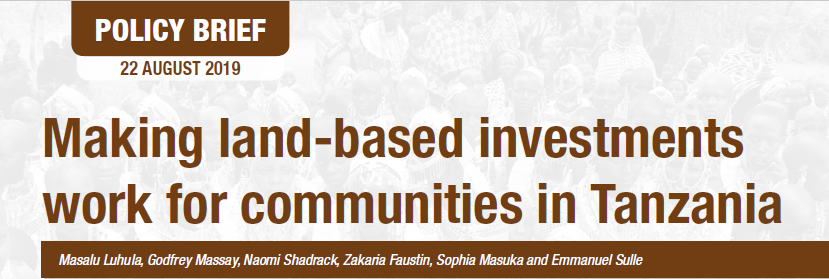TNRF Strategy 2009 - 2011
Publication Type:
Strategy - PlanSource:
Tanzania Natural Resource Forum, Arusha (2009)Keywords:
TNRF Strategy 2009 2011Abstract:
<h2>Vision </h2>
<p>Our vision for improved governance and sustainable renewable natural resource management consists of five straightforward points:</p>
<ul type="disc">
<li><strong><em>Governance</em></strong> – accountable, effective and transparent governance institutions;</li>
<li><strong><em>Policy and law</em></strong> - a responsive and well functioning policy and legal environment that enables sound natural resource management which is environmentally and socially just;</li>
<li><strong><em>Communities</em></strong><em> <strong>and rural livelihoods</strong></em> - people who are empowered, skilled and accountable resource users and managers;</li>
<li><strong><em>Formal enterprise </em></strong>- profitably operating through fair partnerships with rural people for better rural livelihoods and sustained local and national development;</li>
<li><strong><em>Landscapes </em></strong>- that are well managed ecosystems which generate sustainable services and values needed by a diverse range of people and interests.</li>
</ul>
<h2>Mission </h2>
<p>TNRF will work for improved governance and renewable natural resource management by being a demand-driven network of members and partners that helps people to bridge the gap between:</p>
<ol>
<li>People’s local natural resource management needs and practices, and </li>
<li>National natural resource management priorities, policies, laws and programmes. </li>
</ol>
<h2>Objectives </h2>
<p>TNRF will act as a catalyst for <strong>change and improvement</strong> in natural resource management by working with communities, civil-society organisations, and the private sector to:</p>
<ol>
<li><strong>Increase the availability of information</strong>: Increasing the quality and quantity of information available to people on their rights and obligations as natural resource users and managers for achieving sustainable and equitable economic growth through improved environmental stewardship.<strong> </strong></li>
<li><strong>Advocate for better governance and environmental stewardship through collective action</strong>: Supporting partners and members to learn and exercise their rights to pro-actively demand improved governance and better natural resource management for local and wider livelihood and environmental stewardship needs. </li>
<li><strong>Innovate and adapt for enhanced economic and environmental outcomes</strong>: Supporting partners and members to develop <em>innovative ideas, smart approaches and best practices</em> in natural resource management for improving people’s livelihoods, sustaining economic development and enhancing environmental outcomes.</li>
</ol>
<h2>Activities </h2>
<p>The TNRF Secretariat <strong>will widen and improve the participation of its members and partners </strong>in <strong>advocacy, awareness-raising </strong>and<strong> adaptive learning</strong> through:<strong></strong></p>
<blockquote>
<p><strong><em>1. Communications</em></strong> - developing an effective and <strong>demand-driven</strong> and <strong>issue-based</strong> <strong>communications programme</strong> that will include; </p>
</blockquote>
<ol>
<ol>
<li>Holding <strong>regular general meetings</strong> open to everyone acting in a civil society capacity at which topical issues will be presented and discussed, and information exchanged by members and the TNRF secretariat;</li>
<li>Providing <strong>timely, relevant and targeted information</strong> on local, national and regional developments in the natural resource sector useful for members and partners;</li>
<li>Strategically engaging in <strong>reactive advocacy</strong> at the request of its members and partners;</li>
<li>Collaboratively developing <strong>targeted training and informational materials</strong> <strong>and programmes</strong> on natural resource management and governance, particularly for rural communities;<strong></strong></li>
<li>Developing <strong>appropriate working relations and links with central government and Parliament</strong> in order to provide members and partners with more and better channels of engagement and communication;</li>
</ol>
</ol>
<blockquote>
<p><strong><em>2. Working groups </em></strong>- supporting the development of member- and partner-driven <strong>working groups</strong> and their programmes of developing <strong>coordinated</strong> <strong>proactive</strong> <strong>and targeted</strong> <strong>advocacy </strong>in relation to appropriate policies and best practices in natural resource management, conservation and related business enterprise. </p>
<p><strong><em>3.</em> <em>Promoting Benefit Sharing and Payments for Ecosystem services</em></strong> – through:</p>
<ol>
<li> Advocating for effective, efficient and equitable cost-benefit sharing mechanisms in natural resource management – particularly in the context of community-based natural resource management; </li>
<li>Supporting partners and members to develop innovative ideas, smart approaches and best practices for improved ecosystem service valuation, delivery and benefits.</li>
</ol>
| Attachment | Size |
|---|---|
| 279.66 KB |

